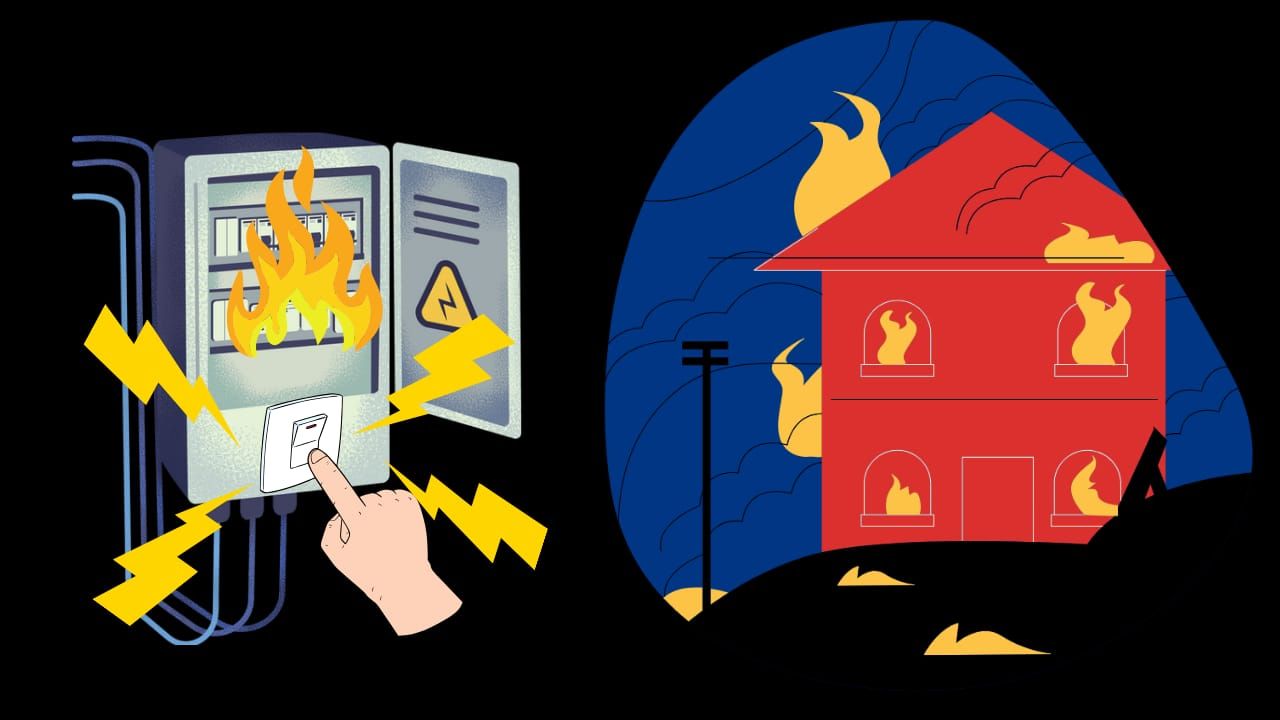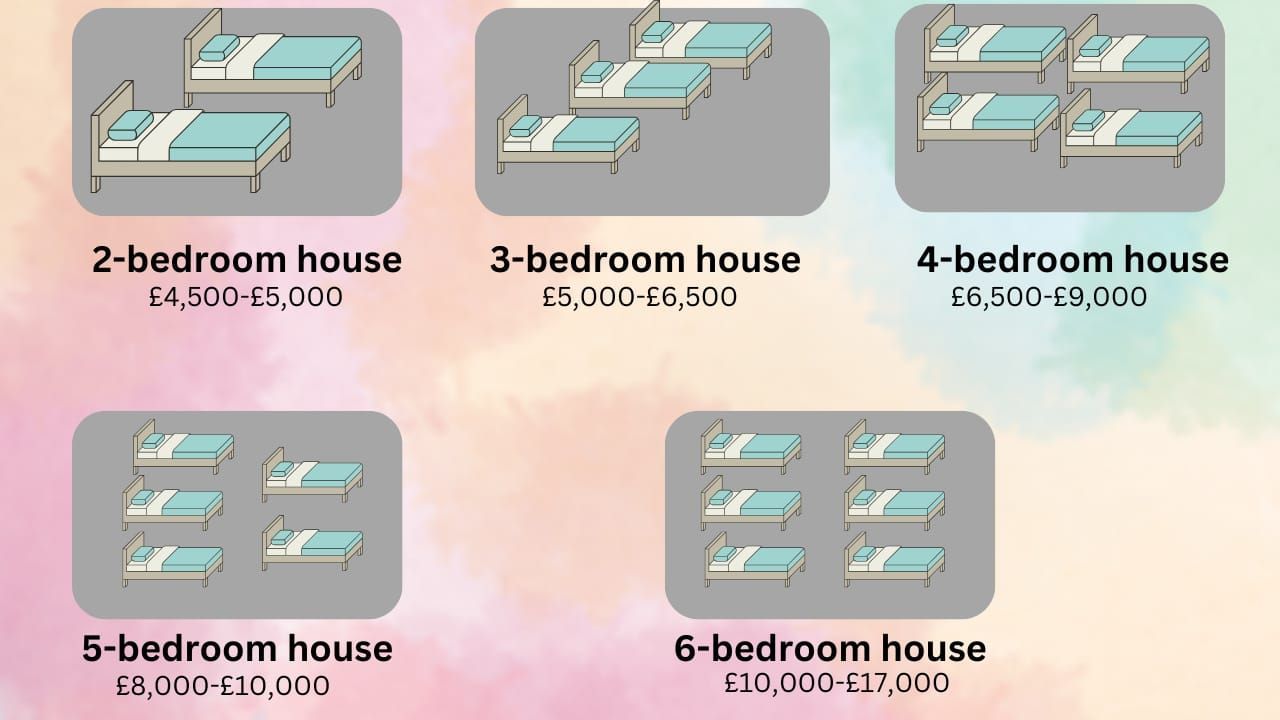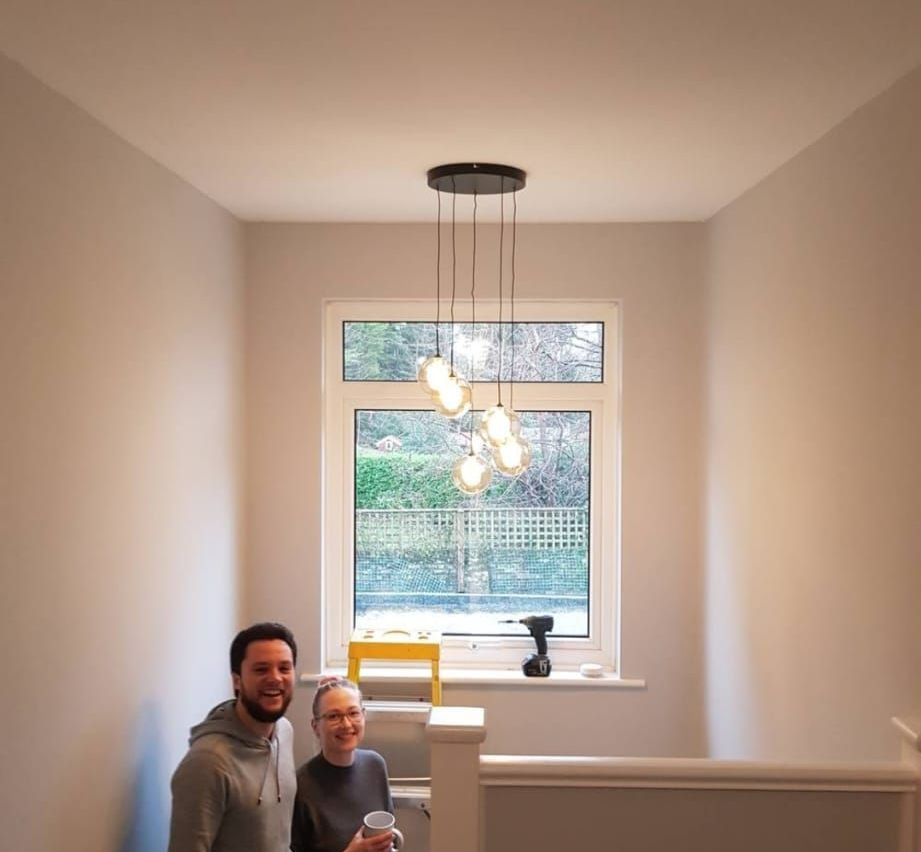Comprehensive Guide to House Rewiring: Costs, Processes, and Considerations
Your home's electrical system needs to be installed to BS7671 standard.
If you've noticed flickering lightsor frequent circuit breaker trips, it might be time to consider rewiring. Get an EICR to assess the condition of your home initially. After that, grasping the costs, procedures, and crucial elements involved can significantly influence the smoothness of the project's progress. From choosing qualified electricians to anticipating future electrical needs, there's much to explore. What steps will you take to ensure your home's electrical safety and functionality?
Benefits of house rewiring:
✅ Improved Electrical Safety
✅ Increased Home Value
✅ Enhanced Energy Efficiency
✅ Future-Proofing
✅ Better Functionality

Contact Us
Introduction
Rewiring a house can feel daunting, but it's a crucial step in ensuring safety and efficiency in your home. You might be dealing with outdated wiring that can't handle your current electrical demands, or perhaps you've noticed flickering lights and tripped breakers. These issues not only disrupt your daily life but can also pose serious safety risks.
Before diving into a rewiring project, It’s important to evaluate your existing electrical system. Take stock of your appliances, lighting, and any modifications you plan to make. Understanding your needs will help you determine the extent of the rewiring required.
It's important to know the local electrical codes and regulations, as they may affect your project.Don't hesitate to consult a licensed electrician, especially if you're unsure about any part of the process. They can provide valuable insights and ensure the work complies with safety standards.
Rewiring a house is a critical project that enhances safety, functionality, and compliance with modern standards. Whether you're updating an older property or addressing safety concerns, understanding the costs, processes, and key considerations is essential.
When tackling the rewiring of your home, you'll quickly find that it's not just about replacing old wires; it's a vital investment in your safety and comfort. Modern electrical systems are designed to handle today's power demands, making them essential for your home's functionality.
Before starting, it's crucial to assess your home's current wiring and decide what needs upgrading. You'll want to consider the age of your electrical system, the layout of your home, and any specific needs you may have, like additional outlets or smart home features.
Costs can vary significantly based on these factors, so it's wise to budget accordingly.During the rewiring process, it's important to hire a licensed electrician to ensure compliance with local codes and safety standards. They'll help you navigate permits and inspections, which are often required.
Remember that this project can disrupt your daily life, so planning for temporary changes is important.Finally, think about the long-term benefits. A rewired home enhances safety and can also increase your property value.Ultimately, investing in rewiring now can save you from future headaches and costs.
Signs Your Home Needs Rewiring
How can you tell if your home needs rewiring? Several signs to watch for indicate it might be time for an upgrade.
First, if you frequently experience flickering lights or tripped circuit breakers, it's a clear warning signal. These issues suggest your electrical system can't handle the demand being placed on it.
Next, check for outlets that feel warm or have a burning smell. This could mean overheating wires, which is a fire hazard. Additionally, if you notice sparks when plugging in devices, don't ignore this alarming sign—it's time to act.
Another indicator is the age of your home. If it's over 40 years old and hasn't been rewired, it likely needs an update to meet current safety codes.
Also, if you've added major appliances or technology and your system struggles to cope, that's a red flag.
Lastly, look for visible signs of wear, such as frayed wires or outdated electrical panels. If you spot any of these issues, it's crucial to consult a qualified electrician to assess your home's wiring and ensure your safety.
Outdated wiring materials (e.g., black rubber, fabric, or lead cabling)
If your home still has outdated wiring materials like black rubber, fabric, or lead, it's essential to take action.
These materials not only pose safety risks but can also lead to costly repairs down the line. Here's why you should prioritise upgrading your wiring:
- Fire Hazard: Black rubber and fabric-insulated wires can deteriorate over time, increasing the risk of electrical fires.Frayed or damaged wires can spark, creating dangerous situations.
- Health Risks: Lead wiring can pose serious health risks, especially if it deteriorates and contaminates your environment.Exposure to lead can lead to significant health issues, particularly for children.
- Insurance Issues: Many insurance companies may not cover damages caused by outdated wiring.
If you file a claim, they might deny it due to your home's wiring not meeting current safety standards.
Frequent tripping of fuses or Micro circuit breakers (MCBs)
Frequent tripping of fuses or circuit breakers can signal underlying issues in your home's electrical system. When this happens, it's essential to take it seriously. You might be excessing circuits by using too many devices on a single outlet, or there could be a short circuit in your wiring.
Start by assessing your electrical usage. If you're regularly using high-wattage appliances on the same circuit, consider redistributing the load. If that doesn't help, check for signs of damage, like frayed wires or burnt outlets. These could indicate more significant problems that need immediate attention.
In some cases, the circuit breaker itself may be faulty or outdated. Upgrading to a modern breaker can enhance safety and reliability.However, if you notice persistent issues despite these measures, it's wise to consult a licensed electrician. They can perform a detailed inspection and identify any hidden complications, such as outdated wiring or improper installations.
Addressing these problems promptly can prevent hazards like electrical fires, ensuring your home remains safe and functional. Don't ignore the signs—your electrical system's health is crucial for your peace of mind.
Flickering lights or light bulbs burn out quickly.
Experiencing flickering lights or bulbs that burn out quickly can be just as concerning as tripping circuit breakers.These issues often signal underlying electrical problems that shouldn't be ignored. You might think it's a minor inconvenience, but it could indicate a more serious issue in your home's wiring.
Here are three potential causes for flickering lights and short-lived bulbs:
- Loose Connections: If the connections in your light fixtures or outlets are loose, they can lead to inconsistent power flow, causing flickering and premature burnout.
- Incompatible Bulbs: Using bulbs that aren't compatible with your fixtures or dimmer switches can result in flickering. Always check for compatibility to ensure your bulbs operate correctly.
- Voltage Fluctuations: Sudden changes in voltage can cause lights to flicker. This could stem from larger appliances drawing power. If you notice this happening frequently, it's worth having a professional inspect your electrical system.
Addressing these issues promptly can prevent further complications and ensure your home's electrical system runs safely and efficiently.Don't hesitate to consult an electrician if unsure about the cause.
Overheating plugs or discoloured sockets
Overheating plugs and discoloured sockets can be alarming signs of electrical issues in your home. When you notice a plug that feels hot to the touch or a socket that's developed brown or black stains, it's crucial to address the problem immediately. These symptoms often indicate overheating, These issues may result from factors like overloaded circuits, faulty connections, or damaged wiring.
If you're using too many devices on a single outlet, it can generate excess heat. Ensure you're not overloading sockets and consider redistributing devices across different outlets.Loose connections can also create resistance, leading to heat buildup. If you suspect loose wiring, it's best to have a qualified electrician inspect your system.
Discoloured sockets usually suggest harm or corrosion, which may pose a safety risk. Don't ignore these signs; they can lead to more severe problems, including electrical fires.
If you notice these issues, turn off the power to the affected area and consult a professional. Addressing overheating plugs and discoloured sockets promptly will help ensure the safety and efficiency of your home's electrical system.
Buzzing or crackling sounds from outlets
A buzzing or crackling sound coming from your outlets can be a sign of underlying electrical problems that shouldn't be ignored.These noises might indicate loose connections, damaged wiring, or even overloaded circuits. Addressing these issues promptly can prevent serious hazards like electrical fires.
Here are three key factors to consider when you hear these unsettling sounds:
- Loose Connections: Check if the plugs fit snugly into the outlets. Loose connections can cause arcing, leading to buzzing sounds and potential fire risks.
- Damaged Wiring: If your wiring is frayed or damaged, it can create electrical interference, resulting in crackling sounds. This often requires professional inspection and rewiring.
- Overloaded Circuits: Too many devices plugged into a single outlet can overload the circuit. This not only causes noise but can also lead to tripped breakers or worse, fires.
If you hear buzzing or crackling sounds, don't hesitate to contact a licensed electrician.They'll help diagnose the issue and ensure your home's electrical system is safe and up to code. Ignoring these sounds can lead to costly and dangerous consequences.
Limited Power Access: Fewer Than Two Sockets in Each Room
Many homeowners find themselves frustrated by having fewer than two sockets in each room, which can limit the convenience of powering devices. You might feel the pinch when trying to charge your phone while your laptop's plugged in, or when using your vacuum in a different room.This lack of outlets can lead to a tangle of extension cords and power strips, which can be unsightly and dangerous.
Rewiring your home to add more sockets is a practical solution. Consider the layout of each room and where you typically use electrical devices. This way, you can plan for additional outlets in convenient locations.You might want to place sockets near nightstands, desks, and kitchen counters for easy access.
Additionally, think about future needs. With the rise of smart home devices, having extra sockets can help accommodate new technology without the hassle of rearranging existing setups.
While the cost of rewiring can vary, investing in more outlets can enhance your home's functionality and safety.
Lack of labelling on the consumer unit or an old unit with a wooden back
If you've noticed a lack of labelling on your consumer unit or have an old unit with a wooden back, it can create confusion and potential safety hazards. Knowing which circuit controls what area of your home is crucial for safety and efficiency. An unmarked consumer unit can lead to unexpected outages or, worse, electrical accidents.
Here are three reasons why addressing this issue is essential:
- Identifying circuits: Proper labelling helps you quickly find the right circuit during maintenance or emergencies, minimising downtime and frustration.
- Preventing overloads: Without clear labels, you might unintentionally overload a circuit by plugging in too many devices, increasing the risk of fire hazards.
- Enhancing safety: An old wooden back unit may not meet current safety standards. Upgrading to a modern unit ensures better insulation and protection against electrical faults.
Taking action now not only improves your peace of mind but also enhances the overall safety of your home.If you're unsure how to proceed, consider consulting a qualified electrician to assess your consumer unit and make necessary updates.
Electric shocks from appliances or switches
Experiencing electric shocks from appliances or switches can be alarming, especially when you least expect it. These shocks often indicate a serious issue with your electrical system, and ignoring them can lead to dangerous situations.
If you feel a mild shock when touching an appliance or switch, it's usually a sign of a grounding problem or faulty wiring.First, check if the appliance is plugged into a properly grounded outlet. If it isn't, that's a quick fix. However, if you notice frequent shocks from multiple devices, you might have a larger wiring problem. It's wise to avoid using the affected appliances until a professional inspect them.
Additionally, damp conditions can increase the likelihood of electric shocks. Ensure that your outlets in kitchens and bathrooms are equipped with Ground Fault Circuit Interrupters (GFCIs), which can help prevent shocks in wet environments.If you continue to experience shocks, it's crucial to consult a qualified electrician. They can diagnose the problem, identify outdated wiring, and ensure your home meets safety standards.
Contact Us

Cost of Rewiring a House
Electric shocks from appliances can signal deeper issues within your home's electrical system, prompting the need for thorough rewiring. Understanding the cost involved can help you make an informed decision.Rewiring isn't just a simple task; it's a significant investment that varies based on several factors.
Here are three key factors that influence the cost of rewiring your house:
- Size of Your Home: Larger homes require more materials and labour, which increases costs.
- Electrical Load: If your home needs a system that can handle a higher electrical load, the costs increase due to the need for specialised materials.
- Accessibility: If your walls and ceilings are difficult to access, it can significantly raise labour costs as electricians may need to work harder to reach wiring.
Average Costs
On average, homeowners expect to pay between £6,000 and £12,000 for a complete rewiring project. This range varies based on several factors, including the size of your home, the complexity of the wiring, and your location. Larger homes typically require more materials and labour, pushing costs higher.
You should also consider the age of your home; older structures may present unexpected challenges, such as outdated wiring or structural issues that need addressing before the rewiring can take place.
Labour costs can also fluctuate depending on your area, as some regions have a higher demand for electricians, impacting overall pricing.Don't forget to factor in additional expenses like permits and inspections, which can add a few hundred pounds to your budget. If you're replacing fixtures or adding new outlets during the rewiring process, these costs will also increase your total expenditure.
Ultimately, it's a good idea to get multiple quotes from licensed electricians to ensure you're getting a fair price. By conducting your investigation and planning, you can better manage your costs and confirm a smooth rewiring experience.
2-Bedroom House: £4,500 - £5,500 (3-4 days)
If you're focusing on a bedroom rewiring project, you can expect costs to range from £4,500 to £5,500, typically taking about 3 to 4 days.This investment not only enhances safety but also improves functionality and aesthetics in your space.
Here are three key considerations to keep in mind:
- Choosing the Right Electrician: Ensure you hire a qualified electrician with experience in residential rewiring. Check their credentials and reviews to avoid potential hassles.
- Planning for Downtime: During the rewiring process, you may need to relocate temporarily. Plan to ensure a smooth transition.
- Upgrading Fixtures: Take this opportunity to consider upgrading your light fixtures and outlets. New, energy-efficient options can improve your room's ambience and potentially lower energy costs.
3-Bedroom House: £5,000 - £6,500 (5-7 days)
When considering a bedroom rewiring project, you should budget between £5,000 and £6,500, with the entire process taking about 5 to 7 days. This cost typically covers materials, labour, and any necessary permits.
First, it's essential to assess the current wiring in your bedroom. Older homes often have outdated systems, which can lead to safety hazards. By upgrading, you not only enhance safety but also improve efficiency and functionality.
During the rewiring process, you'll want to discuss your specific needs with your electrician. Consider elements like additional sockets, lighting fixtures, or smart home integrations. This is the perfect time to customize your space to fit your lifestyle.
While the project takes about a week, expect some disruption. You might need to move furniture or stay elsewhere, so plan accordingly.
After the rewiring, your electrician will conduct tests to ensure everything works safely and efficiently.
4-Bedroom House: £6,500 - £9,000 (7-10 days)
For a larger bedroom rewiring project, you'll want to budget between £6,500 and £9,000, with the work taking around 7 to 10 days.This investment ensures your bedroom isn't only more functional but also safer.
Here are a few key considerations to keep in mind:
- Wiring Requirements: Assess whether your existing wiring can handle modern electrical loads. Upgrading may be necessary for safety and efficiency.
- Fixture Updates: Think about updating light fixtures and outlets. Modern designs not only enhance aesthetics but also improve energy efficiency.
- Permits and Inspections: Familiarise yourself with local regulations. You might need permits for the rewiring process, and inspections ensure everything complies with safety standards.
5-Bedroom House: £8,000 - £10,000 (10-14 days)
Rewiring a bedroom in your house typically requires a budget of £8,000 to £10,000 and takes about 10 to 14 days to complete. This process involves replacing old wiring, upgrading circuits, and ensuring your electrical system meets current safety standards.
You'll want to start by assessing your existing electrical setup. An experienced electrician will evaluate your needs and recommend the best solutions.During the rewiring, expect some disruption. Your electrician will need access to walls and ceilings, so be prepared to move furniture and possibly relocate some items.
It's also a great opportunity to add new outlets or lighting fixtures, enhancing the room's functionality.Make sure to discuss your plans with the electrician. They can guide you on the latest energy-efficient options, which could save you money in the long run.
Remember that while the initial cost might seem high, a well-wired room can increase your home's value and safety.Finally, ensure all work is properly certified. This not only guarantees quality but also complies with local regulations, providing you with peace of mind.
Your bedroom will soon be a safer and more comfortable space!
6-Bedroom House: £10,000 - £17,000 (14-20 days)
Upgrading the electrical system in a larger or multiple bedroom can cost between £10,000 and £17,000 and typically takes 14 to 20 days. This investment ensures your space is safe, functional, and meets modern standards.
When planning this upgrade, consider the following:
- Existing Wiring Condition: Older homes may have outdated wiring that needs a complete replacement, affecting overall costs.
- Number of Bedrooms: More bedrooms mean more outlets and lighting fixtures, which can increase material and labour expenses.
- Customised Features: If you want to add smart home technology or speciality lighting, it can raise the project's complexity and cost.
Multiple quotes from licensed electricians to ensure you're getting a fair price. This is crucial in larger projects, as each electrician may have different approaches and estimates.
Additional Costs
When planning a house rewiring project, you'll likely encounter additional costs that can impact your overall budget. These costs can vary based on the complexity of your project and the age of your home.First, you might need to consider permits and inspections. Depending on your local regulations, these fees can add up, so check with your local building authority.
Next, if your existing wiring is outdated or damaged, you could face costs for repairs or replacements beyond just the rewiring itself. This may include upgrading your electrical panel, It is essential for meeting modern safety regulations with utmost effectiveness.
Don't forget about the costs of new fixtures or outlets. If you plan to enhance your space with additional lighting or outlets, this will add to your expenses.Lastly, consider the cost of labour. While you may be able to DIY some aspects, hiring professionals can significantly increase your budget, especially if unexpected issues arise.
Kitchen Rewire: £2,000 - £2300 plus VAT
A kitchen rewire typically ranges from £2,000 to £2300 plus VAT, depending on the size and complexity of the project. This cost reflects various factors, including the layout of your kitchen, the type of fixtures you choose, and whether you need to upgrade your circuit board.
When planning your kitchen rewire, consider these three key aspects:
- Appliance Upgrades: If you're adding new appliances or upgrading existing ones, you'll need to ensure your wiring can handle the increased load. This might require additional circuits or higher-capacity wiring.
- Lighting Design: Good lighting is essential in a kitchen. Think about installing under-cabinet lighting or pendant lights, which may necessitate new wiring and switch placements.
- Compliance and Safety: It's crucial to adhere to local electrical codes and regulations. Hiring a qualified electrician ensures yours rewire meets safety standards, protecting your home from electrical hazards.
Bathroom Rewire: 1200 - £1,900 plus VAT
Rewiring a bathroom typically costs between £1200 and £1,900 plus VAT, depending on size and complexity.When you consider this project, think about the existing wiring's age and condition. Older wiring may not meet current safety standards, making a rewire an essential upgrade for your safety.
During the process, you might need to make choices about lighting, outlets, and heated towel rails. Bathrooms often require specific considerations due to moisture levels, so ensure you opt for suitable materials and fixtures.Hiring a qualified electrician is crucial, as they'll know the latest regulations and codes.
You should also factor in the time it takes to complete the rewire. Typically, the job can take a couple of days, but it may vary based on the bathroom's layout and any extra work, like relocating fixtures.
Finally, don't forget about the potential for unexpected costs. Discovering issues like water damage or outdated plumbing can add to your budget.
Planning helps you stay within your financial limits while ensuring your bathroom is safe and functional.
Garage Rewire: £500 - £1,200 plus VAT
Considering a garage rewire? It's a smart investment, especially if you use your garage for more than just parking, as proper electrical wiring can accommodate tools, appliances, lighting, and even electric vehicles, turning the space into a functional workshop or utility area.
The costs typically range from £500 to £1,200 plus VAT, but understanding what drives these costs can help you plan better.
Here are three key factors to consider:
- Scope of Work: Determine whether you need a complete rewire or J-specific upgrades. More extensive work means higher costs.
- Material Quality: The type of wiring and fixtures you choose can significantly affect your budget. Opting for high-quality materials may cost more upfront but can save you in the long run.
- Labour Costs: Hiring a qualified electrician is crucial for safety and compliance. Rates can vary, so it's wise to get multiple quotes.#
Inspection Reports: £216 - £350 for initial assessments
When it comes to ensuring your home's electrical system is safe and up to code, getting an inspection report is essential. You'll want to invest in this assessment before diving into rewiring projects. Typically, the cost for an initial inspection ranges from £216 to £350, depending on various factors like the size of your home and the complexity of your current wiring.
During the inspection, a qualified electrician will evaluate your electrical system, identifying potential hazards and areas that need upgrading. They'll check everything from your circuit breakers to your outlets, ensuring everything meets current safety standards.
This process not only helps you understand the condition of your wiring but also provides a roadmap for necessary repairs or updates. Having a detailed inspection report in hand can be invaluable.
It will provide you with a clear understanding of the tasks that need to be accomplished and assist you in making well-informed choices. Additionally, it can act as a valuable reference for future projects, helping to keep you aligned with your goals.
Factors Affecting Costs
Several key factors can significantly affect the costs associated with rewiring your home. Understanding these elements can help you budget more effectively and avoid unexpected expenses.
- Quality of Materials: The type of wiring and fixtures you choose will greatly influence the overall cost. Higher-quality materials may cost more upfront but can save you money on repairs in the long run.
- Labour Costs: The fees charged by electricians can vary based on their experience, location, and demand. Hiring a licensed professional may require a larger initial investment, but it often results in better workmanship and adherence to safety standards.
- Permits and Inspections: Depending on your local regulations, you may need to obtain permits or schedule inspections during the rewiring process. These additional requirements can add to your total costs, so factor them into your budget.
Size of the Property: Larger homes require more materials and time
The size of your property plays a crucial role in the rewiring process, as larger homes demand more materials and time to complete the job. When you have a bigger space, you'll need more wiring, outlets, and circuit breakers, which can significantly increase your overall costs.
Each room typically requires its electrical components, so consider how many rooms you have and their specific electrical needs.Additionally, the layout of your home matters. If you've got multiple floors or a sprawling design, reaching certain areas can take longer and require more labour. You might also need to deal with unique challenges like accessing crawl spaces or attics, which can further extend the timeline.
Don't forget about potential upgrades. If you intend to include additional outlets or implement advanced features such as smart home systems, be prepared to invest more time and resources into the project.
In the end, understanding how the size of your property affects rewiring will help you budget accordingly and set realistic expectations for the project's duration and cost. This knowledge can make the entire process smoother and more manageable.

Final word.
A tree needs strong roots to flourish, your home needs reliable wiring. By investing in rewiring, you're nurturing the foundation of your sanctuary, ensuring it stands tall against the storms of time. Pay attention to the surrounding indicators, as they may be subtle suggestions for necessary changes. By engaging in thoughtful planning and collaborating with experienced professionals, you can enhance your environment, ensuring it remains safe and adaptable for the long term.
ZA Electrical, Your satisfaction and peace of mind are guaranteed from small electrical work like an additional plug socket to a complete re-wire. We have hundreds of satisfied electrical customers who trust our work and recommend us.











